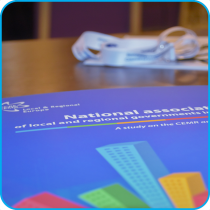Home /
News /
In-depth news /
Governance
next > < previous

Governance and citizenship

Governance - 12.06.2019
New study: CEMR sheds light on associations of local and regional governments
Local and regional governments are remarkable shapers of everyday life. Individually, they provide access to quality public services. Together, they are able to go above and beyond to bring concrete and pragmatic solutions to all citizens.
However, they do not all have the possibility to take action on the national, European or global stage. That’s why we have local government associations: a powerful voice to amplify towns and regions’ demands beyond their individual reach. Local government associations also allow towns and regions to exchange ideas, information and resources on a wide variety of issues.
Through its new study, “National associations of local and regional governments in Europe”, CEMR wants to shed light on the crucial role these associations play in their state’s governance system.
What kind of activities do associations do? How do they organise their advocacy towards central government? What relationship do they keep with Europe? These questions and many more are answered in our study.
The 90-page publication is peppered with many infographics, charts and tables to help complete the analysis. You will also find a series of over 40 ID cards of CEMR’s member associations.
Did you know?
The study reveals that two thirds of the associations only represent cities and municipalities. The reason for this being that there is a far greater number of local governments than other subnational entities.
In terms of staff and human resources, the study also shows that there are major differences from one association to another. The smallest employs 3 people, whereas the largest has 400 employees. Most associations have a team of 10 to 30 people, however.
As the European Parliament recently mentioned in its resolution, associations play a key role in the institutional and political framework. 90% of associations are regularly consulted by central government during the national legislative process, even though consultation is only compulsory in 50% of European countries.
The many facts and figures in this new book help contribute to a better understanding of the role of these associations, and of the original and exceptional structure embodied by CEMR in the history of cooperation between towns, municipalities and regions.
However, they do not all have the possibility to take action on the national, European or global stage. That’s why we have local government associations: a powerful voice to amplify towns and regions’ demands beyond their individual reach. Local government associations also allow towns and regions to exchange ideas, information and resources on a wide variety of issues.
Through its new study, “National associations of local and regional governments in Europe”, CEMR wants to shed light on the crucial role these associations play in their state’s governance system.
What kind of activities do associations do? How do they organise their advocacy towards central government? What relationship do they keep with Europe? These questions and many more are answered in our study.
The 90-page publication is peppered with many infographics, charts and tables to help complete the analysis. You will also find a series of over 40 ID cards of CEMR’s member associations.
Did you know?
The study reveals that two thirds of the associations only represent cities and municipalities. The reason for this being that there is a far greater number of local governments than other subnational entities.
In terms of staff and human resources, the study also shows that there are major differences from one association to another. The smallest employs 3 people, whereas the largest has 400 employees. Most associations have a team of 10 to 30 people, however.
As the European Parliament recently mentioned in its resolution, associations play a key role in the institutional and political framework. 90% of associations are regularly consulted by central government during the national legislative process, even though consultation is only compulsory in 50% of European countries.
The many facts and figures in this new book help contribute to a better understanding of the role of these associations, and of the original and exceptional structure embodied by CEMR in the history of cooperation between towns, municipalities and regions.
 shqiptar
shqiptar български
български hrvatski
hrvatski čeština
čeština dansk
dansk Nederlands
Nederlands English
English eesti keel
eesti keel suomi
suomi Français
Français საქართველოს
საქართველოს Deutsch
Deutsch ελληνικά
ελληνικά עברית
עברית íslenska
íslenska italiano
italiano Gaeilge
Gaeilge latviešu valoda
latviešu valoda lietuvių kalba
lietuvių kalba magyar
magyar македонски
македонски Malti
Malti norske
norske polski
polski português
português română
română Serbian
Serbian slovenčina
slovenčina slovenščina
slovenščina español
español Türkçe
Türkçe svenska
svenska український
український
















































